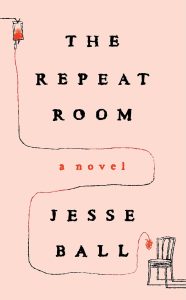The Repeat Room by Jesse Ball: Review by Ian Mond
 The Repeat Room, Jesse Ball (Catapult 978-1-64622-140-0, 256pp, $27.00, hc) Cover by Sara Wood. September 2024.
The Repeat Room, Jesse Ball (Catapult 978-1-64622-140-0, 256pp, $27.00, hc) Cover by Sara Wood. September 2024.
I first came across Jesse Ball back in 2007 when his debut, Samedi the Deafness, was shortlisted for the Believer Book Award (a terrific prize that introduced me to authors as varied as Bennett Sims, Keith Ridgway, Valeria Luiselli, and Danielle Dutton. I miss it… and the magazine). I bought the novel and, of course, did not read it. (The book still sits unread in my garage). It took me a decade to finally get around to Jesse Ball with his 2018 novel Census, about a father dying of a terminal illness who takes his son who has Down’s Syndrome on one last road trip to count the census. While I found Census incredibly moving, the weirder aspects – endless talk of clown schools and cormorants – didn’t work for me. I had no such reservations with Ball’s latest novel, The Repeat Room. In many respects, it’s a stranger, more opaque story than Census, set in a dystopian future with an atypical approach to crime and punishment; a novel that juxtaposes the absurd with the harrowing, the antiseptic with the heartbreaking.
Abel Cotter, a 46-year-old garbage collector, has been randomly chosen for jury selection. For most of us living in a Western democracy, it’s a civic duty we desperately try to avoid at least once, but typically multiple times, in our lives. But Abel isn’t living in our world. His is a dystopia that has done away with “Twelve Angry Men” and replaced it with a single juror. Wearing a helmet and injected with a cocktail of drugs, the juror is sat next to the titular repeat room, which holds the prisoner, and with just a wall separating them, the juror physically and visually experiences the crime. Once done, they are required to pass judgment. While the process puts a massive strain on the juror, we’re told early on that it’s been perfected over ten years, and “you need not fear for your safety” (very reassuring). Still, not everyone can be a juror, so Abel Cotter and a room full of people must undergo a suite of psychological tests to determine who gets to pass judgment.
Ball doesn’t spend too much time fleshing out his dystopian society. It’s enough to know that the Government was overthrown on the “Days of the Change” by a father/daughter duo who operate a chemicals company. More importantly, and very much in the mould of Kafka (to whom Ball has been compared), is how this new world dehumanises its citizens. Every person is given a designation (a series of numbers and letters); the lower the designation, the less valuable you are to society. In a moment of pride, Cotter tells the guard at the courthouse that he’s a heavy machine operator, only to be reminded that he’s “more of a garbageman.” As Abel continues through the process, the seemingly pointless tests and questions, he is reminded of his failures – the death of his son, his wife leaving him, being “deemed incompetent, emotionally incompetent, culturally incompetent.” That Cotter puts up with this, his dialogue clipped, his answers to questions flat and anodyne, speaks to a person already beaten. Cotter’s portrayal is a familiar one. The individual broken by a system that has no time for failures, for ineptitude, for garbagemen. And if all The Repeat Room consisted of was Cotter’s story, my enthusiasm would have been muted.
But Ball takes his story about justice and judgment a step further. Like Cotter, we are asked to sit next to the Repeat Room, and while we haven’t been injected with the drugs and are not wearing the helmet, we are asked to experience the crime that’s been committed, to pass judgment on the criminal. The second half of the novel is extraordinary. I realise I use that word a lot, but I don’t know how else to express what is presented to the reader: a first-person account from a young man who, along with his sister, has been psychologically and physically abused since he was born. It would have been easy to proffer up the abused victim whose only crime is to lash out at their abuser. But Ball digs far deeper than that. I won’t say how exactly, but it’s grotesque and disturbing but also intimate, sad, and sometimes even beautiful. And while we never hear from Cotter again, we’re aware that we are reading what he is physically and psychologically experiencing, expected, at the end of the process, to pass judgment. George Saunders often speaks about how the absurd is the best way to describe how we live, how to “momentarily shuck off our habituation.” The Repeat Room does precisely that. We might be divorced from Cotter’s reality, but it’s in the novel’s absurdity that we are asked to view justice and the worth of a single human life in a new light.
Interested in this title? Your purchase through the links below brings us a small amount of affiliate income and helps us keep doing all the reviews you love to read!
Ian Mond loves to talk about books. For eight years he co-hosted a book podcast, The Writer and the Critic, with Kirstyn McDermott. Recently he has revived his blog, The Hysterical Hamster, and is again posting mostly vulgar reviews on an eclectic range of literary and genre novels. You can also follow Ian on Twitter (@Mondyboy) or contact him at mondyboy74@gmail.com.
This review and more like it in the October 2024 issue of Locus.
 While you are here, please take a moment to support Locus with a one-time or recurring donation. We rely on reader donations to keep the magazine and site going, and would like to keep the site paywall free, but WE NEED YOUR FINANCIAL SUPPORT to continue quality coverage of the science fiction and fantasy field.
While you are here, please take a moment to support Locus with a one-time or recurring donation. We rely on reader donations to keep the magazine and site going, and would like to keep the site paywall free, but WE NEED YOUR FINANCIAL SUPPORT to continue quality coverage of the science fiction and fantasy field.
©Locus Magazine. Copyrighted material may not be republished without permission of LSFF.









